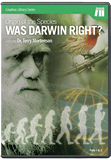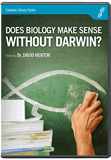Questioning Darwin: a Review
Questioning Darwin, a new HBO documentary filmed in part at the Creation Museum contrasts the views of Charles Darwin with those of Christians who accept the Bible’s account of creation.
Questioning Darwin, a new HBO documentary filmed in part at the Creation Museum in Petersburg, Kentucky, contrasts the views of Charles Darwin with those of Christians who accept the Bible’s account of creation.
Today is Darwin Day, the 205th anniversary of Darwin’s birthday. This weekend, many Darwin Day celebrants will hear sermons claiming that molecules-to-man evolution is compatible with biblical Christianity. Questioning Darwin explains the position of those of us who do not.
Darwin Rejected the God of the Bible
Questioning Darwin explores Darwin’s rejection of the biblical view of God. While Darwin declared himself “not an atheist,” he clearly rejected God as portrayed in the Bible. Darwin’s life story—which Dr. Tommy Mitchell explores in Evolution of Darwin: His Life (available to watch in our media section)—indicates that his early plans to become a clergyman had nothing to do with faith in God.
Darwin wrote that early in his life he did not doubt “the strict literal truth of every word in the Bible.” However, Ken Ham says in Questioning Darwin, “I don’t believe he did believe all the Bible. He didn’t really believe in six literal days of creation. You assume those days of creation are ordinary days, and you take those genealogies in the Bible, and you can only get approximately 6,000 years. You can’t get millions of years. If the idea of millions of years hadn’t been popularized in the late 18th and 19th century, Darwin could never have popularized his ideas of evolution.” (Dr. Terry Mortenson discusses this in “The Theological and Geological Influences on Darwin.”)
Darwin’s Reasons
Questioning Darwin, which will air on HBO several times this month, reveals two reasons Darwin gave to justify his unbiblical opinions:
- diversity in nature
- suffering and death
Darwin’s views are related through his own words and defended by his biographers and evolutionary scientists. Biblical creationists from the Answers in Genesis Creation Museum and several churches and other ministries address Darwin’s complaints and contentions. Filmmaker Antony Thomas included well-chosen sound bites from exhibits at the Creation Museum. Ken Ham, CEO and cofounder of the Museum, explains how these exhibits address Darwin’s claims.
Darwin and Diversity
Questioning Darwin explained that Darwin could not see how biological diversity could have originated in six literal days. Through observations during the voyage of the HMS Beagle and experiments with plants and animals, he saw the dramatic variations that could develop in similar sorts of organisms. He then assumed that, over millions of years, nature itself could have produced new and increasingly complex kinds of organisms. Referring to the variety achievable in, for instance, his pigeon collection, we hear Darwin say, “If feeble man can achieve all these variations in so short a time, by artificial selection, I can see no limits to the amount of change, to the beauty and infinite complexity which may be effected in the long course of time by nature’s power of selection.” Darwin thus equated observable variation within created kinds with unobservable evolution of new kinds.
Darwin thus equated observable variation within created kinds with unobservable evolution of new kinds.
The attentive viewer will hear the answer to Darwin’s question when the film takes us into the Wonders Room at the Creation Museum. There visitors see many short videos explaining how the wonders of creation are consistent with observable science but do not demonstrate Darwinian evolution. One of those videos explains that speciation and variation, built on the genetic information God placed in each kind of organism, is part of God’s plan but is not the same thing as molecules-to-man evolution.
Darwin, by rejecting the biblical truth that animals and plants reproduce after their kinds, extrapolated the effects of natural selection to include the creation of new information and new more complex kinds of creatures. Despite the declarations of Darwin’s defenders that modern science has proven Darwin right, biological science still cannot find any examples of this happening in nature. Natural selection is not an information-creating engine of evolution. If Darwin had accepted God’s eyewitness account of origins and viewed his biological discoveries through that lens, he doubtless would have drawn very different conclusions.
Sight of Suffering
Darwin was disturbed by the suffering he saw in the world. He questioned how a loving God could design animals to kill or allow people to brutalize each other. The death of Darwin’s daughter Annie put “the final nail in his Christian coffin,” according to the film. Darwin could not reconcile the existence of suffering and death with the existence in a good and loving God.
Many people, Christian and non-Christian, struggle with this problem. The Bible contains examples, and Questioning Darwin introduces us to several who are touched by tragedy. Some have benefitted from hitting rock bottom, while others have yet to see God’s purposes in their ongoing tragic situations. Yet each one continues to trust in the love of God and draw strength from his or her relationship with Jesus Christ. The Bible indicates that, while God can and does use suffering to accomplish many purposes in our lives and in this world, God is not the author of evil and suffering. Suffering and death did not enter this world as part of God’s perfect creation but as a consequence and judgment for man’s sin and rebellion against our Creator.
Good Answers
What might have happened if Darwin had been given answers to his concerns about how a loving God could allow death and suffering? Ken Ham comments, “If his professors had taught him that this world is not the way it used to be, that it changed because of sin—maybe if he could have been taught the truth about the history of Genesis, he would have responded differently to the death and suffering issue.”
We do not know what Darwin would have ultimately decided about the God of the Bible if he had had these answers explained to him early in life. Certainly many people who know the truth still reject God’s claims on their lives and His gracious offer of salvation, peace with Him, and abundant life now and forever. But the questions Darwin raised and his conscious and continual rejection of God’s answers—freely available to him in the Bible—are a reminder of the importance of helping all people, and especially young people, find the answers to life’s important questions before they go down the same path.
The Irony of the Abbey
Bible-believing Christians see Darwin’s burial in Westminster Abbey as quite ironic. As Questioning Darwin closes here, however, Darwin is quoted saying, “I have never been an atheist in the sense of denying the existence of God. . . . I feel most deeply that the whole subject is too profound for the human intellect. A dog might just as well speculate on the mind of Newton.”
The author of the book Darwin’s Ghosts then tells us this statement is the “final humble admission from one of the greatest minds of all time.” While Darwin’s work as a naturalist was impressive, he rejected the Creator’s eyewitness account of how nature came to be and imposed his own interpretation on the things he saw. This is not an act of humility but of arrogance. True humility consists in accepting the truth that God tells us about ourselves in His Word. We are all sinful, rebellious, fallible people, and we all need the salvation that only comes through faith in Jesus Christ.
Darwin denied that a loving God existed on the basis of the suffering he saw in the world. But he rejected the greatest testimony of God’s love—the gift of His Son, Jesus Christ.
Darwinian evolution puts stumbling blocks to faith in the paths of many. Questioning Darwin should be a reminder to Bible-believing Christians of the need to provide biblically sound, scientifically solid answers to remove those stumbling blocks that keep many from coming to faith in Christ.
Questioning Darwin closes with a reminder from the Bishop of Carlisle that there “need be no conflict between the study of nature and belief in God.” Indeed there is not. But, molecules-to-man evolution is not the “study of nature” but rather a worldview-based speculation about nature’s unobservable past. Creation scientists see there is no incompatibility between what God’s Word says and what scientists actually observe. And many of the Answers to life’s greatest questions are rooted . . . in Genesis.
Recommended Resources

Answers in Genesis is an apologetics ministry, dedicated to helping Christians defend their faith and proclaim the good news of Jesus Christ.
- Customer Service 800.778.3390
- © 2024 Answers in Genesis












